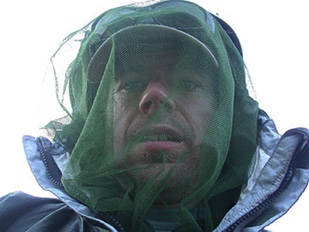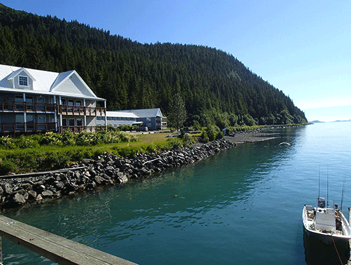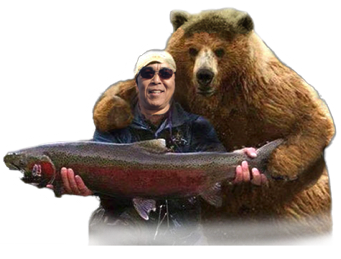RHS'69
To break the routine, we chartered a boat to go ocean fishing for one day.
On this day, the star was my son, Jonathan. He caught a 50 pound halibut and hooked a 30 pound ling cod. I was lucky to catch a big one too.
The other four fisherman on the boat could only manage two small halibut and a few small rockfish.
Flies and Fishes
Monday, December 2, 2019
There's an old story about a mosquito landing at an Alaskan airport.
The ground crew gave it 200 gallons of fuel before they realized it wasn't a 747.
They grow big in the 49th state.
But this story is about fish and not jet-sized bugs although mosquitoes could be the Alaskan state bird.
But Black Flies are another story...stay tuned.
John Takara takes you on his latest Salmon run...
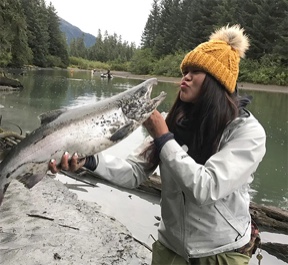
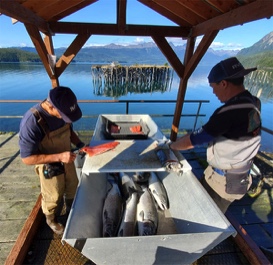
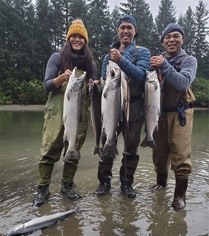
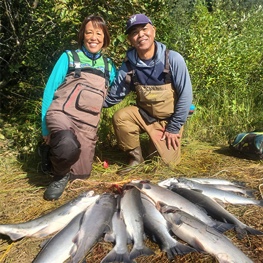
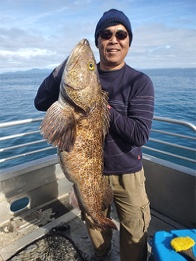
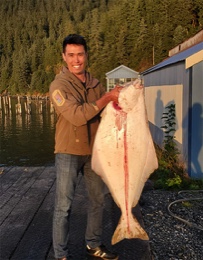
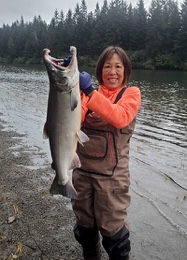

Seven years ago, I was invited to join a group of 12 people from Hawaii who fish for salmon in Alaska every year around Labor Day.
I had such a great time, I’ve joined them every year since, bringing my family along.
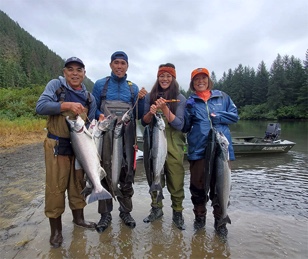
We stayed at the Orca Adventure Lodge in the small town of Cordova, a 30-minute flight southeast of Anchorage.
Three rivers fishable for salmon, all within the Copper River Delta, are within a 20-mile drive of the lodge.
Salmon enter the rivers from the ocean each summer and fall in a suicidal effort to spawn. Pink salmon, the smallest of 5 Alaskan species at 2-4 lbs, will traverse impossibly small, shallow and rocky rivulets of water.
A video we took in front
of a waterfall near the
lodge documents their
desperate efforts.
We, however, were there to fish for a bigger species, the Silver salmon, also known as Coho salmon, average weight 9-10 lbs. They come up the larger rivers to spawn at the headwaters and in lakes.
The fishing experience is unique every year and this year the fishing required extra effort. Low rainfall caused low water levels and lower numbers of salmon than usual in the rivers. The fish were abundant only in the Eyak River.
Because this river is limited to access by boat provided by the lodge, we were able to fish there only two of the eight days we had at the lodge. However, we caught our limit of three fish per person within two hours on both days.
My daughter, Christine, was the star of the outings, catching her limit quickly while looking stylish in a yellow beanie and red headband.
Even my wife, Liane, not usually so prolific, caught her limit on these days.
In the 2009 movie The Princess and the Frog, after kissing a prince who had been turned into a frog by an evil voodoo sorcerer, a beautiful young woman becomes a frog herself and must find a way to turn back into a human before it is too late.
Don't know how this applies to kissing a fish but it seems appropriate to what's happening here.
On other days, the Ibeck and Alaganik Rivers were our only options. The Ibeck, usually very productive, was extremely shallow, and the fishing was poor throughout our stay.
The Alaganik river, the most distant, was inconsistent. One day we fished for eight hours and got nothing. Most other days we caught the limit, but the effort required five to nine hours.
The fish typically swim upriver
periodically in schools. When present
at your locale, multiple catches may
be made in a short time. However,
once the school passes by, it may be
hours before the next school of fish
swims by.
Some claim that their presence in the river is related to the ocean tides, fish entering the river mouths with the incoming tide. Even if true, I’ve found it impossible to predict when the fish will be in the river at my location. So, the only option is to sit and wait.
The sometimes long and boring intervals without
fish are more than compensated for by the thrill
of fighting one and the suspense of whether you
can land it.
Silver salmon are known for their fighting ability,
often making two or three “runs” and jumping out
of the water attempting to shake free.
Frequently, a fish will escape. It may throw the hook, break the line, swim below a tree fallen into the river, or run into the current from which it can’t be pulled.
I lost one fish because it swam around me while I was standing in the river, breaking the line against my leg. Sometimes a fish is lost because it’s just too strong.
To land a fish often challenges skill and strategy.
The typical day went like this. Get to the river by 8am and fish for eight hours to catch the limit. Then, return to the lodge at 5pm and clean, filet, vacuum seal and freeze the fish. Have dinner, shower, hang the waders, boots and other wet equipment in the drying room.
Next, prepare for the coming day, cutting fresh bait, tying hooks, repairing equipment, washing clothes, etc. and be in bed by 11pm.
The next morning, rise at 6am for breakfast and do it again. The experience is fun, but also exhausting.
This year, salmon fishing Alaska was a strenuous, exhausting experience.
Still, the excitement of the catch, the stunning scenery, and reunion with my kids who both live away in California, made for another memorable time.
I’ve already made reservations at the lodge for next year.
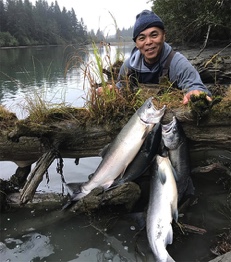
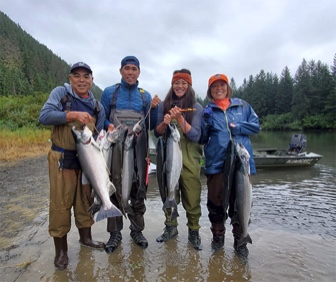
Let's talk about mosquitoes...
Mosquitoes aren't a problem on the river, however, black flies are. They are worse than mosquitoes.
Tiny in comparison, and appearing in great numbers, they form a cloud in front of your face, attracted to your breath. They'll crawl up your sleeves, down your collar and under your hat to bite. On the boney portion at the back of your hands, the bites turn into hard, calloused welts that itch for weeks if not months. Ironically, they are out in force when the weather is clear but avoid rainy, windy weather.
Repellents work, but must be applied liberally and regularly. To protect yourself from the annoying cloud in your face requires a fine-mesh net, like a bee-bonnet, over your head.
Bears are a risk. However, they are generally timid and rarely seen. Only in years where the salmon run is low are they visible, driven from the bush by hunger.
Still, if you are fishing in a remote area, you want to be carrying bear repellent spray.
